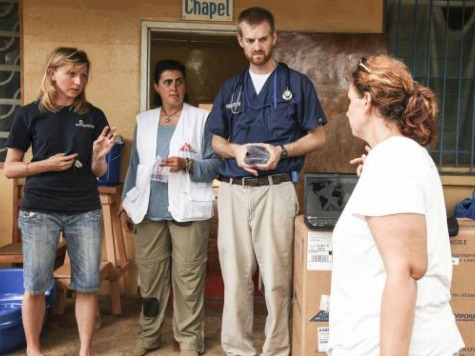
In her article explaining why Time honored Ebola medical workers as their Person of the Year in 2014, managing editor Nancy Gibbs describes the workers’ weapons as “bleach and a prayer.” No description could be more apt, as a great number of those on the front lines in West Africa were working to serve Christian organizations, and none were shy in expressing their belief that Christianity would save them from harm.
Global organizations, from the Center for Disease Control to the World Health Organization to the World Bank sounded the alarm on the Ebola disaster this summer. By the end of September, the WHO declared that the “world is losing the battle” to contain the disease. Some nations responded– most notably, the United States sent thousands of troops to Liberia– but many government entities did little. China pledged millions to the cause, but Chinese industry leaving the region because of Ebola could significantly damage the economies of west Africa just as much. In December, the WHO missed its own containment goals, including having 70% of both Ebola victims properly buried and 70% of Ebola patients isolated in medical facilities (only in Guinea did they achieve this goal).
Amid the lack of enthusiasm internationally to fight Ebola– and the lack of resources on the part of panicked organizations like the WHO– smaller Christian organizations stepped in, sending individual health care workers to fight Ebola on the front lines in the affected countries. These groups, with minimal resources compared to the world’s largest governments, made it a personal effort to combat the disease.
Perhaps no Christian charity worker has been more high-profile than Dr. Kent Brantly, the first American doctor to contract Ebola. He survived by receiving a transfusion from a teenage former patient he had helped saved from Ebola, along with the experimental drug ZMapp. Dr. Brantly initially refused a dose of ZMapp, opting to give his to his colleague, Nancy Writebol, despite the potential of leaving orphaned two sons
Before leaving the hospital, Brantly made an unambiguously Christian declaration to the public waiting to hear from him: “I serve a faithful God who answers prayers. Through the care of Samaritan’s Purse and the SIM missionary team in Liberia, the use of an experimental drug, and the expertise and resources of the healthcare team at Emory Hospital, God saved my life.”
Upon being released from the hospital, Brantly seemingly responded positivity to every request for blood donations. His blood helped cure Dr. Rick Sacra, another Christian American doctor, and Texas nurse Nina Pham, who stated in a press conference following her recovery, “through all this ordeal, I have put my trust in God.”
Brantly, Writebol and Sacra all served with Christian organizations, the former two with Samaritan’s Purse, and Sacra with Serving in Mission. But elsewhere in the world, Ebola fighters were also of Catholic background. Spain, for example, lost two priests to Ebola– 75-year-old Miguel Pajares and 69-year-old Manuel García Viejo— and, in efforts to save them, became the first nation to have an Ebola contamination outside African soil.
Nurse assistant Teresa Romero contracted Ebola while treating Viejo. Romero, also gave thanks to God— and Santiago (Saint James), the patron saint of Spain– for her recovery.
Churches and Christian groups were not only influential as missionary teams of European helpers. Local churches within Liberia, Guinea, and Sierra Leone played a pivotal role in organizing communities. In one particular community in Liberia, President Ellen Johnson Sirleaf made a personal visit in thanks noting that, without the power of the church, the town may have lost its entire population to Ebola. Throughout much of Africa, villages refused to believe Western medics when they came to notify the community of the dangers of Ebola. They hid Ebola patients from aid groups, flouted quarantines, attacked Western-looking doctors, and insisted on dangerous traditional burial routines.
In New Georgia Community, Liberia, workers at Christ Kingdom Harvest Church convinced the community that Ebola was real, quarantines were necessary, and the health workers entering the town were not bringing Ebola (a common conspiracy theory). Having deep roots in the community, it was easier for church workers to tally family members and ensure that all were accounted for while government workers came to treat patients. The Church also encouraged the community to embrace Ebola survivors, often the targets of stigma in communities to which the return, both on a Christian basis and for the wellbeing of the community.
At a time of great need, when global government institutions like the United Nations and large governments like China and Russia failed, Christians of every denomination– from the tiniest African church to the servants of the Vatican– filled a void that only private charity could. Their praise on the cover of one of the world’s most influential magazines is among the most merited to hold the Person of the Year title in quite some time.

COMMENTS
Please let us know if you're having issues with commenting.